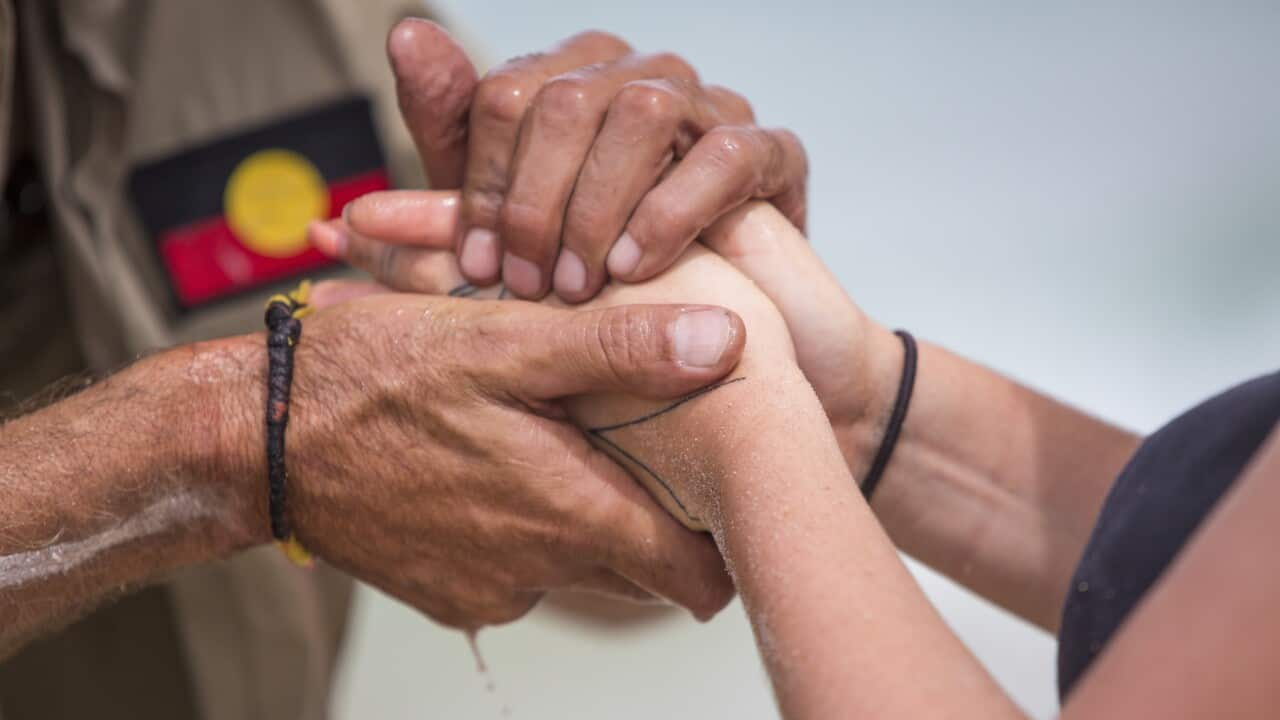Key Points
- The Truth-telling and Healing Inquiry seeks to paint “an accurate picture” of the effects of colonisation on Aboriginal and Torres Strait Islander peoples.
- Ivan Ingram, a Wiradjuri and Filipino lawyer, is one of the five appointed board members of the Inquiry.
- Board members will be exploring the laws, policies and practices, and looking at the effects that these have had and continue to have on Aboriginal and Torres Strait Islander peoples.
Listen to the podcast

Filipino-Wiradjuri Lawyer appointed as one of the five Truth-telling & Healing Inquiry members in Queensland
SBS Filipino
09/10/202418:06
Brisbane-based human rights lawyer Ivan Ingram urges new and emerging migrant communities to learn more about Australia’s First Nations peoples as the hears evidence from Indigenous and non-Indigenous people in Brisbane.
The Wiradjuri and Filipino lawyer was appointed to the Board of Inquiry earlier this year.

Brisbane-based human rights lawyer Ivan Ingram Credit: Embellysh Photography
“Learning about my own people's legal history has astounded me”
Born and raised in the small rural town of Parkes in central New South Wales to a Filipino mother and a Wiradjuri father, Ingram knows the importance of learning about family history.
“My mother [came] here to Australia seeking a better future — being of migrant background, she comes with an open mind. She often comes to me for advice on what might be appropriate ways of engaging with First Nations communities. That is a great example of being the change you want to see."
Prior to his appointment as Member of the Inquiry, Ingram was a Judicial Registrar with the Federal Court of Australia in the native title practice area and was the first Indigenous appointment to that role with the Court.
His learnings in and out of Australia and, his upbringing in rural New South Wales help him “contextualise the realities in which people live”.
I was surprised to learn for myself the full and extensive legal history that is not well-known about Aboriginal and Torres, Strait Islander Australians. There'd be moments in my career where learning about my own people's legal history has astounded me.Ivan Ingram, Human rights lawyer
“The access to that knowledge and the expanded vocabulary on how to communicate that knowledge has really helped the way I approach my discussions with all people.”
“I appreciate that those who come here to Australia seeking a better future may not necessarily have had the opportunity to go through our education system if they've come here later in life, but their children will.”
The Inquiry and Path to Treaty Act
The historic, Queensland-based Inquiry is the first step under the Path to Treaty Act 2023. It will provide a report and recommendations on how to protect the rights of Aboriginal and Torres Strait Islander peoples.
Ingram says that he recognises that many Queenslanders from culturally diverse backgrounds move to Australia to start over, build a better life for themselves, and heal from past traumas.
The truth-telling process will allow Queenslanders to heal and move forward with respect. Sharing that history will help build understanding and achieve healing to allow us to have a more inclusive future.Ivan Ingram, Human rights lawyer
Since July, the Truth-telling and Healing Inquiry has been hearing testimonies from Indigenous and non-Indigenous individuals from across the State and examining evidence and records held by government and public institutions.
The Board of Inquiry is composed of a majority First Nations members who each bring a variety of experiences, skills, lived experiences and perspectives.
Along with Ingram, the five appointed members include its chairperson Joshua Creamer, and other members Cheryl Buchanan, Vonda Malone and Roslyn Atkinson.
Purpose of the Inquiry
The was established by the Queensland government in May 2023, six months before the federal government held its referendum on The Voice to Parliament.
Mr Ingram said it is important to clarify the main purpose of the Inquiry for Queensland despite last year’s referendum outcome where all six states, voted against a First Nations Voice to Parliament. In Queensland, close to 70% voted ‘No’.
This is a Queensland-based inquiry, so it is quite separate to the process that was undertaken last year in respect of the Commonwealth's referendum in relation to a Voice to Parliament. This process is focused on identifying the truth of our past and our history.Ivan Ingram, Human rights lawyer
“This means exploring the laws, policies and practices, and looking at the effects that these have had and continue to have on Aboriginal and Torres Strait Islander peoples.
“Truth-telling is important because it will share many perspectives — Indigenous and non- Indigenous — and acknowledge those experiences.
"It allows us to make the necessary observations and findings to identify areas where we can make legislative, policy and practice changes for real outcomes and tangible opportunities for Aboriginal and Torres Strait Islander in Queensland."


